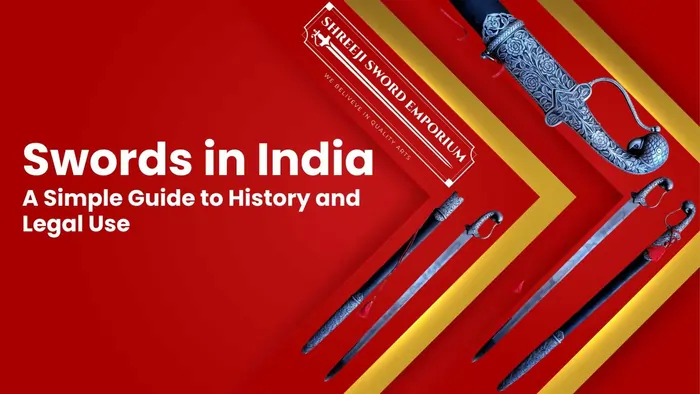

Swords have played a significant role in shaping India’s history, culture, and heritage. From the mighty warriors of ancient India to the skilled martial artists of today, swords have been a symbol of bravery, power, and prestige. In modern times, however, the role of swords has shifted, and their legal status has become more complex. This comprehensive guide aims to explain everything about swords in India—from their history to the legal restrictions and their practical uses today.
The Historical Importance of Swords in India
The significance of swords in India dates back thousands of years. From the royal courts of the Rajputs to the spiritual symbolism in Sikhism, swords have been more than just weapons. They represent honor, sacrifice, and skill. Indian swords such as the Talwar, Khanda, and Katar have distinct styles that reflect the diverse martial traditions across the country.
The Talwar: A Classic Indian Sword
The Talwar is one of the most recognized Indian swords. It has a curved blade, which makes it especially effective in cavalry combat. Historically, the Talwar was used by warriors on horseback, particularly in the northern regions of India. Its design allows for powerful slashing attacks, making it a formidable weapon in close combat.
The Khanda: A Symbol of Valor
The Khanda is another significant sword in Indian history, primarily associated with Sikh warriors. Unlike the Talwar, the Khanda has a straight, double-edged blade and is known for its weight and sturdiness. Its design allowed warriors to deliver strong, cutting blows, and it remains a symbol of valor in Sikh traditions.
The Katar: A Unique Dagger
The Katar is a distinctive Indian blade, often referred to as a “punch dagger.” Its triangular blade makes it ideal for close-quarters combat. It was widely used by soldiers for quick, stabbing attacks and was also considered a symbol of royalty and prestige.
Are Swords Legal in India?
When it comes to the legality of swords in India, the laws can be somewhat tricky. Different states have different regulations, and the type of sword, its intended use, and the specific local rules all play a role in determining whether you can legally own or carry a sword.
General Rules for Sword Possession
In most states, owning a sword for personal collection or as a decorative item is allowed under specific conditions. However, carrying a sword in public places is typically restricted. This restriction is part of India’s broader weapons laws aimed at maintaining public safety. For example, licensed security personnel may be allowed to carry certain types of weapons, including swords, under controlled conditions.
However, these licenses are not easy to obtain, and individuals without a valid reason or documentation can face penalties if found in possession of a sword in a public place. As a result, it is essential to check the local regulations in your area before purchasing or carrying a sword.
Swords in Religious and Cultural Contexts
While the general rule restricts sword ownership and carrying in public, there are exceptions. For example, Sikhs are allowed to carry a Kirpan, a small sword or dagger, as part of their religious practice. The Kirpan holds deep religious significance in Sikhism, symbolizing a Sikh’s duty to protect the weak and promote justice. This exception is recognized under Indian law, allowing Sikhs to wear the Kirpan without facing legal issues.
Practical Uses of Swords in Modern India
Although swords are not as practical as modern firearms for self-defense, they still hold value in specific contexts. In traditional martial arts training, such as Kalaripayattu or Gatka, swords play a crucial role in developing skills related to close-quarters combat. Many people also collect swords as a way to honor their cultural heritage or for decorative purposes.
Martial Arts Training
Several Indian martial arts incorporate swords as part of their training. These martial arts are not just about physical prowess but also about building mental discipline and understanding the philosophy behind each weapon. For example, Kalaripayattu, one of the oldest martial arts in India, uses swords like the urumi, a flexible, whip-like sword, to train warriors in agility and control.
Collectors and Historical Enthusiasts
Swords also attract collectors who appreciate the artistry and craftsmanship that goes into making each piece. Historical swords, particularly those from the Mughal or Rajput eras, are prized possessions for many collectors. These swords not only serve as a reminder of India’s rich past but also as pieces of art that showcase intricate designs and techniques.
Can You Carry a Sword in Your Car in India?
The simple answer is no—you cannot carry a sword in your car unless you have specific legal permission to do so. The law treats the carrying of swords much like the carrying of firearms, which means strict regulations apply. Carrying a sword in your car without proper documentation could result in legal trouble, including fines and even imprisonment.
Exceptions for Licensed Individuals
There are a few exceptions. If you are a licensed martial arts instructor, a collector with the proper permits, or someone using the sword for a specific cultural or religious event, you might be allowed to transport the sword. However, you must ensure that you have all the necessary paperwork and permissions in place before doing so.
What Weapons Are Legal in India?
India has very strict laws governing the possession and use of weapons. While firearms are heavily restricted, certain other weapons, like knives, axes, and spears, may be allowed under specific circumstances, such as for agricultural or ceremonial purposes.
Knives and Other Tools
While swords are generally restricted, owning and carrying knives for personal use or in professions such as farming or carpentry is usually permitted. However, these knives must be under a certain size, and even then, carrying them in public places may require a valid reason. Similarly, tools like axes and spears may be allowed in rural areas for agricultural or hunting purposes.
Is It Legal to Buy a Sword?
Buying a sword in India is generally legal, but it depends on the type of sword and the seller. If you purchase a sword from a recognized and licensed seller, you will likely be within the bounds of the law. Many stores selling traditional Indian swords provide the necessary documentation for legal purchases. However, you should always check the local laws and ensure that the sword you are buying complies with the rules in your state.
Where to Buy Swords in India
If you are interested in purchasing a sword, it is essential to buy from reputable dealers. Avoid buying from unlicensed sources or street vendors, as they might sell swords that are not legally permitted. Reputable stores will often have the proper licenses and can guide you through the legalities of owning a sword.
Can You Carry a Sword on a Flight in India?
The short answer is no. Indian airlines, like most airlines worldwide, have strict regulations against carrying weapons, including swords, on flights. Even if the sword is meant for ceremonial or martial arts purposes, you must follow the rules set by the airline and airport security. In most cases, swords will need to be checked in as luggage rather than carried on board, and special permissions may be required for transporting them.
Legal Self-Defense Tools in India
For self-defense, swords are not a practical or legal option for most people. Instead, consider using legal self-defense tools such as pepper spray or stun guns, which are widely available and effective in emergencies. Taking self-defense classes can also help you protect yourself without the need for weapons.
Pepper Spray for Self-Defense
Pepper spray is one of the most popular non-lethal self-defense tools available in India. It is easy to use, affordable, and legal to carry. Pepper spray works by incapacitating an attacker for a short period, giving you time to escape or seek help.
Stun Guns for Protection
A stun gun delivers a powerful electric shock to the attacker, temporarily immobilizing them. Although stun guns are less common than pepper spray, they are another legal option for self-defense in India.
Conclusion Swords remain a fascinating part of India’s history and culture, but understanding the legalities around them is crucial in modern times. Whether you are a martial artist, a collector, or someone interested in the cultural significance of swords, knowing the laws and regulations will help you stay within the boundaries of the law.
EXCELLENTTrustindex verifies that the original source of the review is Google. Loved this placeTrustindex verifies that the original source of the review is Google. Awesome craftsmanship, Royal vibes, totally worth it! 5 stars!Trustindex verifies that the original source of the review is Google. Superb awards,pure,heritage,top quality!Trustindex verifies that the original source of the review is Google. I recently bought a sword from Shreeji Sword Emporium, and it’s fantastic! The quality is top-notch—sharp steel, stunning design, and flawless finish. A 6th-generation family craft, their royal heritage shines through. Delivery was prompt, packaging perfect, and the price fair. Highly recommend for sword enthusiasts—5 stars for amazing craftsmanship and service!Verified by TrustindexTrustindex verified badge is the Universal Symbol of Trust. Only the greatest companies can get the verified badge who has a review score above 4.5, based on customer reviews over the past 12 months. Read more


May I help you!